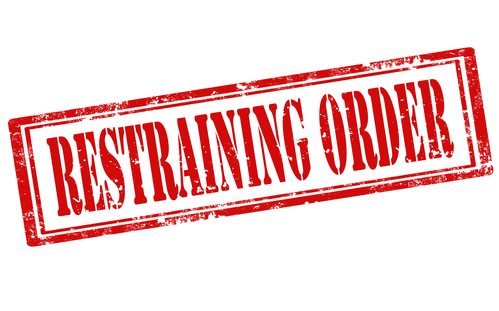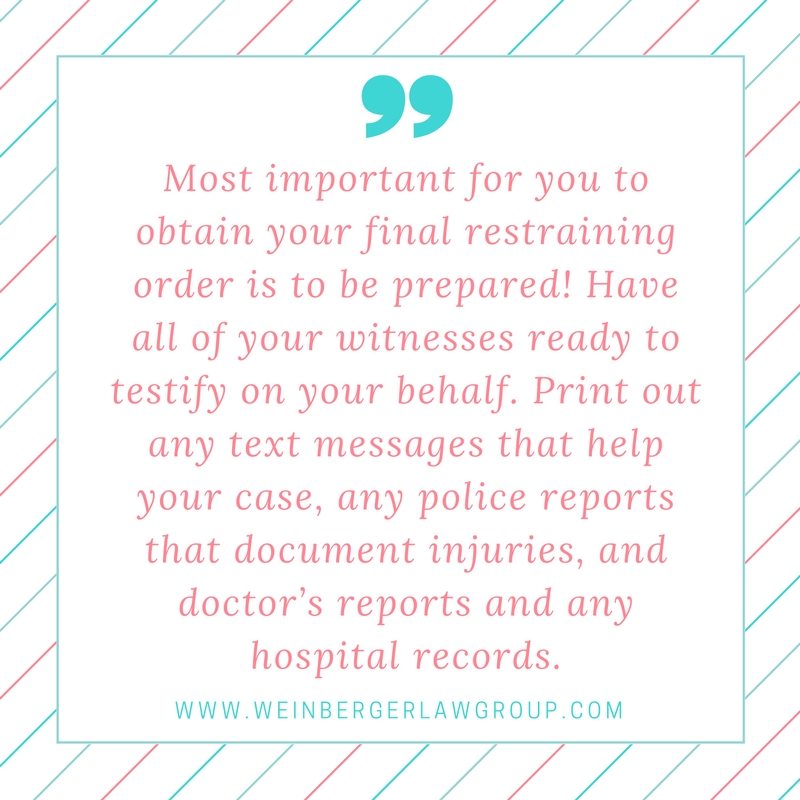TRO To FRO: Making A Temporary Restraining Order Final
 If you have found yourself in an abusive relationship and you are ready to obtain a restraining order against your abuser, you have made a smart and brave decision. The New Jersey court system stands ready to assist people in domestic violence situations when they are ready to move forward and obtain protections for themselves and their families. What does this process entail? And how do you go from a temporary restraining order to a final one?
If you have found yourself in an abusive relationship and you are ready to obtain a restraining order against your abuser, you have made a smart and brave decision. The New Jersey court system stands ready to assist people in domestic violence situations when they are ready to move forward and obtain protections for themselves and their families. What does this process entail? And how do you go from a temporary restraining order to a final one?
Firstly, if you are in an emergency situation, get out if you can. If you are near a phone, call 911. Your safety and the safety of your children is most important. Once you are away from your abuser, you can then take the step to get a Temporary Restraining Order (TRO). If it is after normal court hours (8:30am to 4:30pm) you can obtain a TRO from your local police station. If you have called 911 for help, the police who respond can assist you in getting your TRO. In getting a TRO, you have to show the judge that is on duty that an act of domestic violence occurred and that you are in danger. It is a fairly easy process to obtain the TRO because your abuser does not need to be present or give his or her side of the story.
Once the TRO is granted, your abuser is served with the paperwork by the police or sheriff. They are prohibited from any contact with you whatsoever, including telephone or text messages. The court will schedule a final restraining order hearing within ten days. At that hearing, you will have to prove your case to the judge in order to get your TRO converted to a Final Restraining Order or FRO.
Going From Temporary to Final Restraining Order
You should strongly consider having an attorney represent you in your FRO hearing. The hearing is like any other court proceeding: there is evidence presented, witnesses are called and questioned. You are subject to being cross-examined by your abuser or their attorney. They judge may also ask you questions on the witness stand. The procedure can certainly be complex and also frightening, especially since you must tell the story of your abuse in the presence of your abuser.
You have the burden to prove two things to the court:
1. That an act of domestic violence occurred when you obtained the TRO, and
2. That you need the continued protection of the FRO, which remains in place, in most situations, permanently. Once you prove that an act of domestic violence happened, you are allowed to show the court past incidents of domestic abuse that occurred between you and your abuser. This helps bolster your case to show the judge that you need the FRO to protect you.
Other ways you can prove your need for the FRO is by calling witnesses to the abuse, including any police that responded to your emergency call, certified phone records that show harassment or text messages that show threats of violence. Any evidence that you bring to court with you has to be authenticated, including phone records and police reports by an employee of the organization who can swear to the genuineness of the documents. Again, consider an attorney who is experienced in domestic violence hearings to assist you.
If you do not prove that both an incident of domestic abuse occurred and that you need continued protection from your abuser through an FRO, you will most likely not be successful in obtaining your final restraints. Courts do not lightly issue FROs and take into consideration whether or not continued protection is needed based on your relationship status. For example, if you and your abuser have no children and now live in different states, the judge may not see that an FRO is necessary to keep your abuser away from you.
Most important for you to obtain your final restraints is to be prepared. Have all of your witnesses ready to testify on your behalf. Print out and have ready any text messages that help your case, any police reports that document injuries, and doctor’s reports and any hospital records. Be sure that you follow the rules of court and New Jersey law when it comes to authenticating documents and subpoenaing witnesses to appear in court.
When you are ready, we are here for you to discuss your case. Please contact us to schedule your free consultation so we can advise you on your specific situation. Our attorney are compassionate and experienced in all aspects of domestic violence law in New Jersey and will advocate for your protection and the protection of your children.
Read More:
Domestic Violence: Signs, Signals And Help
Free Ebook: A Guide for Victims of Domestic Violence in New Jersey [Download]



